 Food
and drinks Food
and drinks |
Kazaks also love having guests and are generous
in their hospitality. There is a saying, "Kazaks'
hearts are like the steppes - wide, kind and generous."
Regardless of the hour of arrival of the guests,
Kazak women will immediately set to work to prepare
a "dastarkhan" - a table full of food.
If guests arrive and the table remains empty,
the host is shamed. At a minimum, each guest must
sit down and have tea. Having tea includes bread,
fruits & nuts, cookies and sweets.
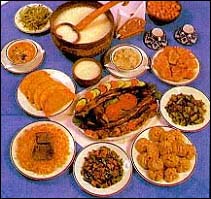
Kazakh dastarkhan has its own long story, traditions,
and specifics inherent to Kazakh nation only.
It is known for a particular manner of receiving
and serving guests. The part tea is a very important
in Kazakh dastarkhan. In fact any Kazakh feast
invariably starts with a minutely itemized process
of tea drinking. After a host welcomes his guests,
invites them to the table. Only girls and young
women pour the tea. And they do this wonderfully
though it is far from easy. For one should see
to it that the guests' drinking bowls be always
full, there must be no confusing them, there must
be no tea leafs remains on the edge of the bowls.
Even if the guest gives to understand that he
has already quenched his thirst he must not be
left unattended - the hostess must offer him a
so-called "sui-ayak" - a tea bowl of honor. Tea
is normally accompanied with cream, butter, jam,
dried and fresh fruit, nuts, cakes, and other
sweet meals. Tea is an introduction, an invitation
to a capital meal - a festive feast.
First they serve all sorts of appetizers, mostly
meat ones - prepared of horse flesh and mutton.
They are quite plentiful and their diversity is
just as great. It is all made of smoked, semi-smoked
and boiled meat. Flat cakes and such milk tonics
as kumys, shubat and katyk are added to the meal.
They are followed with vegetable tidbits with
invariable flat cakes. Next the guests are treated
with a kuyrdak - a hot rich roast meat prepared
of mutton by - products mostly of liver, kidneys,
heart, lungs and tail's fat. After a small break
the guests are treated with all sorts of patties:
"samsa"- with meat, "puktermet"- with by- products,
"belyashes", "kausyrma" and all...
There are few recipes of Kazakh traditional meals:
a) Besbarmak ("five fingers")
Cover 3-4 kg (6-9lb) of choice fatty meat(mutton,
beef and horse) with water and simmer. Make a
stuff dough using 250g (9oz) flour, eggs, 1tsp
salt and some water. Roll the dough into a circle
1mm thick and cut it into 10-cm squares. Add 5-6
whole peeled potatoes to the meat 20 minutes before
it is ready. Remove the cooked meat from the broth
and cut it against the grain into small pieces.
Remove the potatoes and skim off about 200g (7fl
oz) of the broth (including the surface fat) for
the sauce. Carefully place the noodles into the
broth and boil them. When cooked, place the noodles
on the plate, with the meat in the center and
the potatoes, cut into pieces, around the edge.
Pour over reserved broth, seasoned with black
pepper and two or three onions sliced into rings.
Serve hot.
b) Kuurdak (offal stew)
Chop beef or lamb heart, kidneys, liver, lungs
and meat fillet into 1-cm cubes. Do not mix the
different meats together, but place them into
separate plates. Chop an onion and 5-6 potatoes
into 1-cm cubes. Melt 50-80g (2-3oz) of butter
in a large cast-iron pan, add the lungs and fry
them for about 5-7 minutes. Then add kidneys,
heart and fillet, and after 20 minutes the onion,
liver and potatoes. Fry, stirring continuously,
until all the pieces are evenly cooked. Season
with salt and pepper to taste, and serve immediately.
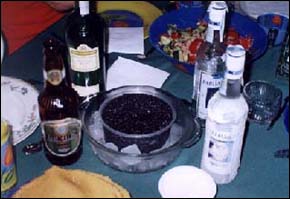
Kazakhstan is also a producer of high quality
caviar.
|
c) Baursaki
Knead yeast dough containing 200g flour, 1/8t salt,
1t yeast, and enough water to just hold it together.
Allow the dough to rise as bread. To make round
baursaki, cut a piece of dough, shapea long sausage
of 2-cm diameter. Then cut it into 2-cm pieces and
fry in 3cm of oil until they become golden.
d) Kazy
This is a sausage made of fatty horse-meat. Rub
a mare's rib with salt, garlic and black pepper.
Put cubeb meat into a clean gut and add the rib,
tying its end around the rib, smoke and boil for
3 hours. After the Kazy is done, cut slightly the
gut, remove rib and slice the meat (or leave in
the gut to store until you serve it).
e) Kumys
Kumys is a sour milk beverage made of mare's milk.
In new warm mare's milk add about 25% of sour-milk
bacillus ferment and milk yeast, stir us continuously
with a whisk 20 to 30 mins. Let stand 2-3 hours,
then stir again. In a little while, pour the blend
in bowl, cover tightly and let stand in a cool place.
Finally there comes the capital treat - besbarmak.
First they cover a large round or oval dish with
small round flat pieces of boiled paste followed
by small bars of boiled horse-meat or mutton, then
comes onion cut in rings and scalded with hot broth,
all this strewn with a green mixture of fennel,
parsley and kinza...
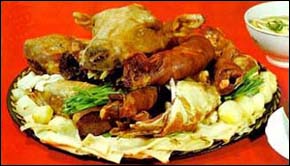
The most honored guest is usually offered
a koy-bas (a boiled sheep's head). The guest is
to dress it and distribute among the other participants
to the dastarkhan. One should mind that each part
of the head is attached particular significance
and meaning: young men are treated with ears for
them to be attentive, girls - with a palate (it
is believed that this would make them more diligent).
The head having been divided the host proceeds with
cutting meat on the main dish and shares it with
his guests.
Here too one has to mind certain habits and superstitions.
For instance, hipbones and crus are offered to most
honored guests while the breastbone goes to the
son-in-law or daughter-in-law, vertebra - to married
women, pregnant ones first and foremost.
Certain
bans are also to be observed. Thus even the most
honored guest may not be treated with a "koy-bas"
if his father is present at the table.
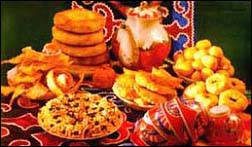
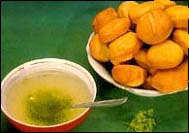
Children may not be offered brains (they might become weak-willed), just as an elbow bone - to a young girl (she might be "left on the shelf")...
The meat is usually accomplished with flat cakes with onion (ak nan). A rich broth (sorpa) is poured in separate bowls. However in many areas of Kazakhstan besbarmak on the dastarkhan is replaced with "kespe", Kazakh noodle soup: in a drinking bowl or a soup-plate they put warmed up noodles and pour tuzdyk on them, a gravy consisting of meat, black radish, sweet pepper, onions, tomatoes and green kinza.
|

